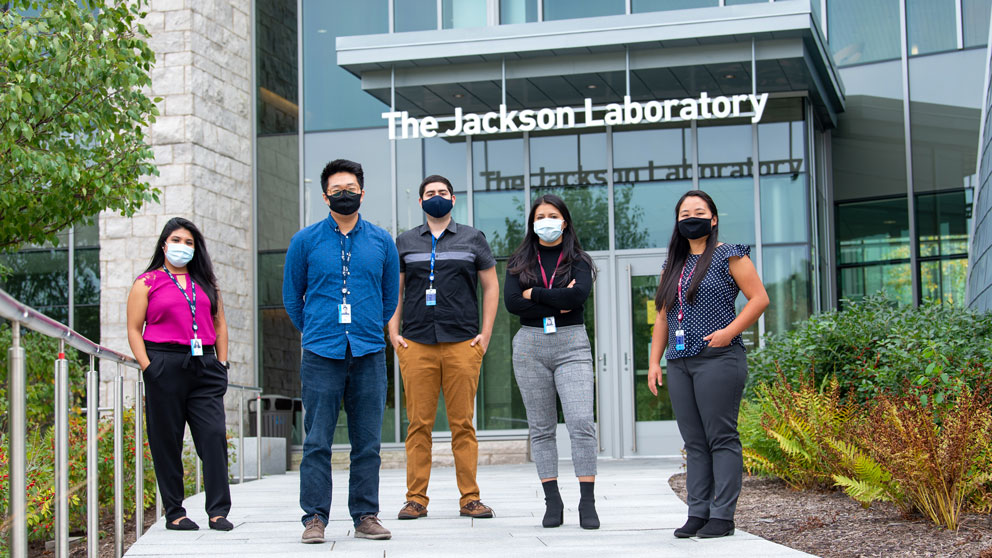
The next group of MD/PhD students who have joined PostBacc@JAX. From left to right: Gisela Del Valle, Scott Lee, Jacob Flores, Johanna Riera, and Jin Komerska. Photo by Cloe Poisson.
Recent undergrads join PostBacc @ JAX to prepare for dual degrees in biomedical sciences.
Both an MD and PhD are doctoral degrees; however, an MD is associated with treating patients and a PhD is associated with research. For example, an MD might diagnose a patient with cancer and then enroll them in a clinical trial. Whereas, a PhD might work to develop platforms for testing cancer drugs before they go to clinical trials (like JAX’s Muneer Hasham, Ph.D.Wide array of research interests includes infectious diseases, immune disorders and cancer pathogenesis. Muneer Hasham ).
The barrier between these two fields is that important breakthroughs discovered by PhD scientists often have to go through a translational process before being implemented by MD clinicians to benefit the patients.
Some ambitious scientists-in-training want to be involved specifically in that bench-to-bedside process, and opt to pursue MD/PhD dual degrees. “After gaining clinical and research experiences throughout college, I realized that physician-scientists are best equipped to harvest the potential of discoveries made in the lab and apply them in clinical contexts” says Scott Lee, Postbaccalaureate Intern, The Jackson Laboratory (JAX).
The MD/PhD degree training is known to be particularly rigorous, and requires the most dedicated, passionate scientists. The Genomic Education team at The Jackson Laboratory offers PostBacc @ JAX fellowships that prepare early career trainees for success in MD-PhD graduate programs through a two-year program, which offers mentored research experience in one of JAX’s labs, pursuit of an independent research project, and educational opportunities, like attending Courses and WorkshopsOffering educational programs virtually, in Maine, Connecticut and across the globe!JAX Courses and Conferences, participating in professional development workshops, and benefiting from individualized graduate school application support.
Gisela Del Valle, Jacob Flores, Jin Komerska, Scott Lee, and Johanna Riera are joining PostBacc @ JAX, as the next step on their MD/PhD paths. These trainees will be based at The Jackson Laboratory for Genomic Medicine (JAX-GM) in Farmington, Connecticut, under the mentorship of JAX PIs, who will integrate them into their research groups for the duration of their training.
Meet the PostBaccs

Gisela Del Valle. Photo by Cloe Poisson.
Gisela Del Valle
Gisela will utilize techniques such as single cell transcriptomics to study pluripotent cell biology, regulatory networks, tumor heterogeneity and more in Paul Robson, Ph.D.Areas of expertise include single cell transcriptomics, primate/human early embryonic development, maternal-fetal medicine, fetal programming, pluripotent cell biology, regulatory networks, tumor heterogeneity, circulating tumor cells.Paul Robson’s lab . Previously, she studied Biochemistry and Molecular Biology at Fisk University and was driven by her strong curiosity for science.
She enjoys the endless opportunities that science provides for increasing the learning curve through new discoveries. She is drawn to the MD/PhD track because she wants to study the micro and macro components of diseases and learn how they can be translated towards treating patients in a clinical setting.
Outside of lab, Del Valle likes hiking and jogging, as well as painting, cooking, and action movies.

Jacob Flores. Photo by Cloe Poisson.
Jacob Flores
Jacob will utilize genomics, bioinformatics and molecular biological techniques to investigate the ways in which repetitive DNA elements, such as transposons, affect human genomes, in Christine Beck, Ph.D.Investigating the mechanisms and consequences of genomic rearrangements with a focus on repetitive elements.Christine Beck’s lab . Previously, he earned a BS in Biochemistry and Molecular Biology from Houston Baptist University.
Drawn to the MD/PhD track, Jacob wants to commit to involvement in the full patient care spectrum. His career goal is to provide care for patients in the present while working towards innovative treatments for the future.
While at JAX, he hopes to meet mentors and professionals in research and medical fields who will help him define his specific research interest and abilities.
He finds inspiration in learning about the unknown, and views research as an outlet to use creativity to solve biological problems. “I find myself wanting to formulate new ideas, connections, and thoughts surrounding the underlying mechanisms of the cell,” says Flores.
Outside of lab, Flores resets with running, hiking, and trying new restaurants.

Jin Komerska. Photo by Cloe Poisson.
Jin Komerska
Jin will leverage advanced technologies to investigate infectious diseases, human and other mammalian microbiomes in . Previously, she earned a BS in Biochemistry from Grinnell College.
“I chose PostBacc @ JAX because I value JAX’s work to increase equity in healthcare and its dedication to personalized medicine,” Komerska says.
She is working towards an MD-PhD because she wants to be involved with multiple aspects of providing treatments. Through this track, she aims to approach issues from multiple perspectives to gain a broader view of medical topics
“I am grateful for continued guidance as I prepare for the next steps in my education and career,” she says about PostBacc @ JAX.
Outside of the lab, Komerska enjoys playing ultimate frisbee, being outdoors, and petting dogs.

Scott Lee. Photo by Cloe Poisson.
Scott Lee
Scott will utilize genomic technologies and mouse modeling, including patient-derived xenografts and genetically engineered mouse models, to discover and validate novel biomarkers and therapeutic targets of pediatric cancers, in Ching Lau, M.D., Ph.D.Dr. Lau specializes in pediatric brain and bone tumor research. His clinical interests include neuro-oncology, solid tumors, and osteosarcoma.Ching Lau’s lab . He is joining JAX with a BS in neuroscience from Saint Louis University.
He will use his time at JAX to pursue independent research opportunities and clinical experiences, that he knows are paramount when applying to MD/PhD programs.
Down the road, he plans to use his degrees to spearhead his own lab and help patients recover from devastating diseases.
Outside of lab, he enjoys learning different languages, jogging, and watching (an embarrassing amount, in his words) of Korean dramas.

Johanna Riera. Photo by Cloe Poisson.
Johanna Riera
Johanna will study the human microbiome for its potential to deliver treatments for infectious and other diseases, in Julia Oh, Ph.D.Our central goal is to develop microbiome therapeutics to treat human disease. We use diverse tools like genomics and synthetic biology to investigate our microbiome’s role in our health and engineer therapeutics.Julia Oh’s lab. She is joining JAX with a BS in Biology from New Jersey City University.
“I found that JAX overlaps with my research interests in wanting to both find and accelerate cures for human diseases, such as cancer,” She says. She is excited for the opportunity to train and be mentored by researchers with these same passions.
She knew that she wanted to pursue the MD/PhD path since her first introduction to research. “I see how scientific discoveries can save lives; meanwhile, patient interactions can aid in answering research questions that further advance medicine and science.”
She views science as a complex jigsaw puzzle and sees the benefit of scientists working together as a team to further discoveries. Outside of the lab, she likes chasing adrenaline with activities like running, cliff jumping, and paragliding.
PostBacc @ JAX Legacy
Del Valle, Flores, Komerska, Lee, and Riera are the fourth generation of PostBacc @ JAX trainees, and the first generation based in Farmington, Connecticut.
This cohort follows in the footsteps of program alumni such as Alisha Tillman and Christian Monroy-Hernandez. While at JAX, Tillman studied female fertility in the Bolcun-Filas lab and Monroy-Hernandez studied how genetics influence susceptibility to addiction in the Chesler lab. This fall they began graduate studies at Auburn University’s Via College of Medicine and Washington University at Saint Louis, respectively.
About PostBacc @ JAX and the Genomic Education team
PostBacc @ JAX supports JAX’s mission to discover precise genomic solutions for disease by offering a program for trainees to immerse themselves in an independent research project with direct ties to human health and disease, and the Genomic Education team’s mission by creating a diverse and inclusive educational program that supports trainees from communities and with backgrounds underrepresented in the biomedical sciences.
The Genomic Education team at The Jackson Laboratory (JAX) is committed to creating diverse and inclusive educational programs where all students, employees and visitors feel valued and are empowered to participate in our mission to improve human health through genomics research, scientific resources and education.
The Genomic Education team aims to ignite the passion of future scientists, advance careers, and inform the general public about the unfolding promise of genetics and genomics. In addition to PostBacc @ JAX, Genomic Education offers a variety of learning and research experiences for emerging scientists including the Cooperative Ph.D. Program, Summer Student ProgramA ten-week summer research fellowship in mammalian genetics and genomics. Summer Student Program , Teaching the Genome GenerationTeaching the Genome Generation™ includes high school teacher professional development and academic year support of innovative lessons in genetics, genomics, and personalized medicine.Teaching the Genome Generation , Maine State Science FairThe Maine State Science Fair is one-day science and engineering competition for Maine public, private, and home schooled high school students.Maine State Science Fair , and STEM Open Houses in Open HousesThe Maine High School Open House provides students an opportunity to learn about JAX research and careers in biomedicine.Maine and Connecticut High School Open HouseThe Jackson Laboratory for Genomic Medicine (JAX-GM) welcomes high school teachers, students, and their families to our campus for an evening of engaging research presentations and career exploration. Connecticut.